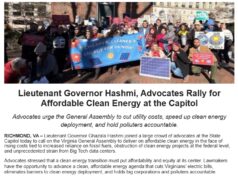by Mike Tidwell, founder and director of the Chesapeake Climate Action Network, which is fighting hard against Dominion’s proposed fracked-gas pipeline monstrosities – Lowell
Virginia Governor Terry McAuliffe is worried – rightly so — about his legacy. He leaves office in just four months and rumors are he wants to run for President in 2020.
So how will citizens, three or 30 years from now, remember him? Maybe they’ll recall his valiant (but unsuccessful) efforts to expand Medicaid in Virginia? Or his role as Consoler-in-Chief after the white supremacy violence in Charlottesville? Or his trade missions to China that rendered, at best, mixed results?
The answer, actually, is none of the above. What people in Virginia and across America will best remember Terry McAuliffe for in years to come is his pending approval of two massive pipelines for fracked gas. Who, after all, could forget an industrial pipe-laying spree so huge that it would constitute the biggest land-clearing and land-seizing project in Virginia since the Federal Highway Program of the 1960s? And who, on a planet hurdling toward climate disaster, would forget two massive pipelines for fracked gas that will trigger new greenhouse gas emissions equal to building 45 new coal-fired power plants in the state?
These are just some of the astonishing impacts associated with Atlantic Coast and Mountain Valley Pipelines. The two projects are proposed to run from the fracking fields of West Virginia and into Virginia, covering more than 1,000 miles.
But here’s the good news for McAuliffe’s legacy and the nation: an absolute final decision has not been made to build yet. McAuliffe can still say no to the pipelines during his final days this autumn, an option just bolstered earlier this month in federal court. State governors, according to a federal judge in New York, can reject pipeline permits when water quality and human health are threatened.
Using his state power under the federal Clean Water Act, New York Governor Andrew Cuomo denied permits to build the proposed Constitution Pipeline. Cuomo asked the pipeline company Constitution LLC to provide data proving that the trenching and drilling and clear-cutting of forests for the pipeline would not endanger the state’s water quality. The company could not comply. Cuomo rejected the pipeline, with overwhelming support from voters. And now he’s won in court.
The difference in Virginia is that Terry McAuliffe hasn’t even asked the pipeline companies to prove they will protect water quality. Controversial energy company Dominion Energy – a close political friend of McAuliffe’s – would be the builder of the Atlantic Coast Pipeline. Documents from regulatory agencies show the pipeline would use a radical engineering process requiring the removal of 38 miles of Appalachian ridgetops in Virginia and West Virginia. The ridges would be blasted away, reducing the mountain heights between 10 and 60 feet. The pipeline would also cross 1,600 rivers, creeks and wetlands that provide habitat for trout and drinking water for people.
Yet Terry McAuliffe and his beleaguered Department of Environmental Quality have not even asked Dominion to provide “site-specific” plans for how the pipeline would affect these water bodies. Dominion does not want to release the data, nor does the company EQT, builder of the Mountain Valley Pipeline.
Tragically, this summer, McAuliffe forced Virginia citizens to offer “public comments” on the pipelines at “hearings” held across the state. The Harrisonburg hearing alone drew 500 people overwhelmingly opposed to the pipelines. Farmers were there whose land would be seized through imminent domain for pipelines that economists say are not even needed due to a recent leveling off of gas demand. At four other hearings statewide, opponents pointed out that fracking and pipelines produce dramatically fewer jobs than wind and solar power. If he maintains his pipeline support, in other words, the Governor would be reducing jobs while favoring pollution. Not a good combo.
All of this, long after the Medicaid skirmishes are forgotten about, could be McAuliffe’s legacy. People will say his name and think obliterated mountains and ruined rivers. Or not. He could, instead, use the evidence at hand and reject the pipelines in the coming days. He could then be known forever as the governor who saved the ridgetops, protected the water, created more jobs, preserved family farms, and actually took action to move Virginia toward the goals of the Paris Climate Agreement.
But time is running out. History is waiting. And the stakes have never been higher for Virginia – and McAuliffe.


![[UPDATED 1/29/26] Audio: Sen. Tim Kaine Talks to Blue Virginia About His “Five-Point Plan” to Fight Trump’s Orban-Like Assault on US Democracy; Civil Disobedience a la MLK Jr.; Trump’s Bogus “Energy Emergency”; the Crucial Importance of the 2025 VA Elections; etc.](https://bluevirginia.us/wp-content/uploads/2025/02/kaineinterview2-238x178.jpg)
![VA DEQ: “pollution from data centers currently makes up a very small but growing percentage of the [NoVA] region’s most harmful air emissions, including CO, NOx and PM2.5”](https://bluevirginia.us/wp-content/uploads/2026/01/noxdatacenters-238x178.jpg)





![Video: Regarding the 2025 VA Election – Which Democrats Won in a Landslide – Trump Points Insanely/Falsely to “Cheat[ing]”](https://bluevirginia.us/wp-content/uploads/2026/01/weigeltrumpspanbeger-100x75.jpg)

